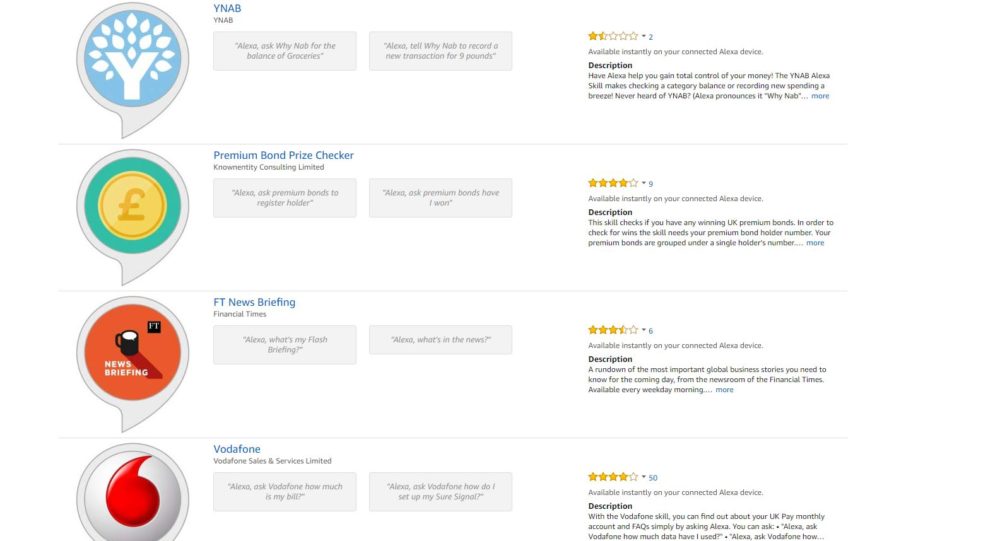With the rise of Siri, Cortana and Google Assistant, we’re seeing more and more voice searches.
Comscore says that 50% of all searches will be done through voice by 2020. Further research by Gartner shows that around 30% of searches will be made without a screen by that point.
Far from just being able to look up cinema times and put on some Frank Sinatra, voice search can provide a boost to your business – given that it’s used the right way.
Optimise your business for voice search
Firstly, you need to know that the voice command only reads out the top search result. It’s known as ‘Position Zero’ on Google. This will be the featured ‘snippet’ above the normal first place result position.
Snippets can be made up of paragraphs of text, lists or tables. You might be familiar with the catch-up and info snippets below. The first is on desktop and the second on mobile.

If your business isn’t there, you’ll be much harder to find and your conversions will fall, as SEO expert, Neil Patel, explains:
“Conversions from voice search will be lower because people won’t be going to your website. At least, until we can figure out how to solve this as marketers.”
You can improve your chances of being seen by adapting the language that you use so that it’s more conversational. Voice search takes the intent and context of the question into account rather than just the wording, so your focus must be on the user and solving their problem.
For example, instead of saying ‘ski jacket’, searches will be more like ‘blue women’s ski jacket size 12′.
It’s also worth noting that it favours content from social media, especially when looking for video or images. Beefing up your social media strategy is a fine idea at this point.
As well as being conversational, you should get on to question-based searches. Consider how common questions will be relevant to your business – queries beginning with ‘how’ are the most popular.
Again, it helps to think of the user and their thought process when doing searches. ‘What’ or ‘who’ questions tend to be asked when beginning research and ‘where’ queries suggest that they’re ready to act.
Voice search is good for local businesses
Voice searches are more likely to be localised as they’re often off-the-cuff queries. This plays into the hand of businesses in a physical space because of the common ‘near me’ search, like ‘restaurants near me’ or ‘barbers near me’.
Sorting out your Google My Business rating will help you greatly here. It’s also worth getting your listing on Yelp, and Yahoo! Local too, keeping the information as consistent as possible across all of these platforms. Those which have positive reviews will fare best.
You should still focus on traditional SEO, converting long-tail keywords into conversationally-worded searches, securing reciprocal links and giving or getting reviews on your business.
Search is all about links so build strength from other local websites in the form of backlinks and social media shares.
You might not have thought of it, but having a well-thought-out FAQ page can help you get noticed through voice search. Answers are often short, sharp and conversational – perfect for snippets which fit into Google’s Position Zero.
How can I adapt my technology and software to voice search?
Implement Schema, a code that is added to your site and helps search engines return the best results.
Schema prefers structured data because the page is well-organised and there are tags to accompany the page, making it easier to sort. Google mostly uses these structured pages for featured snippets (the ones with pictures).

There are different schema types linked to reviews, organisations, local business, e-commerce, events, recipes, jobs and more.
Google has a tool for page-by-page implementation of structured data called The Structure Data Markup Helper to assist with this.
It should be the case already, but make sure your site is mobile-friendly. An average voice search loads 52% faster than an average page, so Google won’t waste time on pages which take a long time to load. Secure your site with Secure Sockets Layer (SSL) too. Most of Google’s search pages are, so if yours aren’t they probably won’t be found.
Being on Amazon is helpful for voice search
Moving back to web, it helps to have an Amazon presence as it’s a major force in voice commerce. Alexa bases results on Amazon search relevance, sales performance and order history – an easy leg-up for popular sellers.
Alexa also has ‘Skills’ which are similar to mobile apps. These are skills that Alexa can perform in-line with certain commands. Business owners will find Skills from their mobile phone provider or favourite newspaper useful. For example, you can say “Alexa, what’s in the news?” and it will access the Skill to provide your answer.

Even physical stores are making use out of it – Alexa Shop Assist can direct customers to products when there aren’t any staff members available to help them.
You can make your own Skill so that customers can easily reorder regularly-purchased products or get updates if you’re a content provider. As it involves coding, you’ll need to find a developer who can create a Skill for you.
How does voice search affect my small business?
All of this can seem abstract without any real-world examples. That’s why we spoke to a couple of entrepreneurs about how they use – or plan to use – voice search.
Pete Kinder, CTO at Wax Digital, says that voice is useful for both the business and the customer.
Voice recognition technology has huge potential to speed up and smooth out procurement processes when combined with AI. Employees use it to place orders and it can be used for analysing organisational-wide spend.
Imagine the convenience of asking the device questions such as: “How much did we spend on stationery in Q2?” and it immediately replies with the facts and figures you need.
Voice-enabled technology can also make eAuctions a far simpler process. Instead of having to check supplier rates, you can verbally ask the system, enabling prompt decisions to be made. Procurement professionals are able to perform everyday admin tasks much more quickly, including approving or declining purchases and sending invoices to customers or suppliers, simply by speaking to an app.
Andrew Gorry, head of digital at Mojo Mortgages, talks about the importance of schema.
Voice search is an emerging digital trend which many experts believe could increase in volume dramatically in the coming years. We are mindful of deploying best practice structured data and schema mark-up and site content to make the most of the opportunities presented.
In addition to the more common organisation schema detailing opening times, for example, we plan to leverage speakable schema in the future. This will allow us highlight areas of content we believe add greatest value to voice search and therefore should be featured in voice search results.
Other than leveraging specialist schema we plan to produce large amounts of appropriately structured content following a natural conversational feel, typically in a question answer flow. This will allow for interpretation for voice search and give a greater user experience.
Infographic: voice search for small business
For the visual learners, this infographic from Headway Capital covers the essentials of voice search.
OK, Google: How to Optimise for Voice Search, courtesy of Headway Capital






